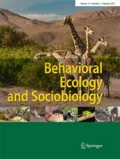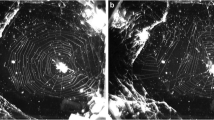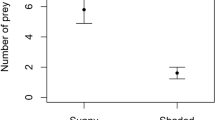Abstract
The nocturnal orb-web spider Larinioides sclopetarius lives near water and frequently builds webs on bridges. In Vienna, Austria, this species is particularly abundant along the artificially lit handrails of a footbridge. Fewer individuals placed their webs on structurally identical but unlit handrails of the same footbridge. A census of the potential prey available to the spiders and the actual prey captured in the webs revealed that insect activity was significantly greater and consequently webs captured significantly more prey in the lit habitat compared to the unlit habitat. A laboratory experiment showed that adult female spiders actively choose artificially lit sites for web construction. Furthermore, this behaviour appears to be genetically predetermined rather than learned, as laboratory-reared individuals which had previously never foraged in artificial light exhibited the same preference. This orb-web spider seems to have evolved a foraging behaviour that exploits the attraction of insects to artificial lights.
Similar content being viewed by others
Author information
Authors and Affiliations
Additional information
Received: 8 June 1998 / Received in revised form: 18 January 1999 / Accepted: 19 January 1999
Rights and permissions
About this article
Cite this article
Heiling, A. Why do nocturnal orb-web spiders (Araneidae) search for light?. Behav Ecol Sociobiol 46, 43–49 (1999). https://doi.org/10.1007/s002650050590
Issue Date:
DOI: https://doi.org/10.1007/s002650050590




